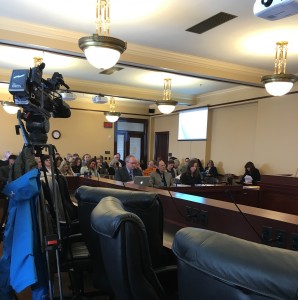At least two bills are poised to change how the state controls e-cigarettes while health department regulators said they will continue to work with representatives of the so-called “vaping industry” to create fair rules that they say are designed to protect children.
Jan. 12, the Legislature’s Administrative Rules Committee discussed proposed standards directed at e-cigarettes and vaping fluids that contain substances such as nicotine. The use of e-cigarettes among Utah youth has skyrocketed in the past few years and the conflict between state legislators, local proponents of the “vaping” industry, and the Utah State Health Department will continue into the 2016 legislative session.

Rep. Paul Ray, R-Clearfield, told the committee he has been working on legislation to restrict the use of e-cigarettes for the past three years. Aaron Frazier, with the Utah Smoke-Free Association that represents manufacturers of e-cigarettes and vaping fluids, told lawmakers that he felt that health department officials had ignored his association’s concerns in discussions about regulations. Ray said that he had heard from the industry and health officials and felt that proposed regulations were “about right” in balancing concerns raised by both groups.
Along with negotiations about regulating e-cigarettes, Ray wants to make it more difficult for teens to buy the tobacco alternative. If e-cigarette regulation bills passes, e-cigarettes will receive an 86 percent tax increase, a tax already in place for other tobacco products.
“These teens are basically inhaling carcinogens, and the nicotine is likely to cause big time health concerns like cancer and brain defects,” Ray said. “At first it was kind of just me against the world. Now there are a few kids at Davis High School, like student body president Cade Hyde, that are tired of watching their classmates go down this road and so they reached out to me and are helping me out.”
Similarly, Rep. Kraig Powell, R-Heber, is concerned with the health of the youth in Utah and their use of nicotine products. He is proposing to change the age limit for tobacco users from 19 to 21.
“There are undisputed health risks with the use of any tobacco product. Most people start when they are predominately young, and in fact relatively few people start after they are 21,” Powell said. “I think we will always have enforcement issues, but this will make it easier for stores to comply because there will be a uniform regulation with the legal age of purchasing alcohol.”
However, Frazier said he is committed to protecting the e-cigarette community and plans to fight any attempts to tax or restrict e-cigarette use from Utah’s Health Department or lawmakers. Frazier believes that if the taxation bill passes, consumers in the state will retreat back to regular tobacco smoking because it will become the more affordable option.
“This is the third year legislators will try and put a higher tax on our industry,” Frazier said. “At least 9 million adults in the United States are using e-cigarettes. If it passes, a $20 bottle will jump up to about $38 and small business owners will probably reach bankruptcy. People would have to drive across state lines to get a good deal.”
Dr. Robert Rolfs, deputy director of the Utah Health Department commented that in no way is the new regulation trying to hurt or belittle small businesses.
The Powell and Ray bills have yet to be introduced with a bill number.




